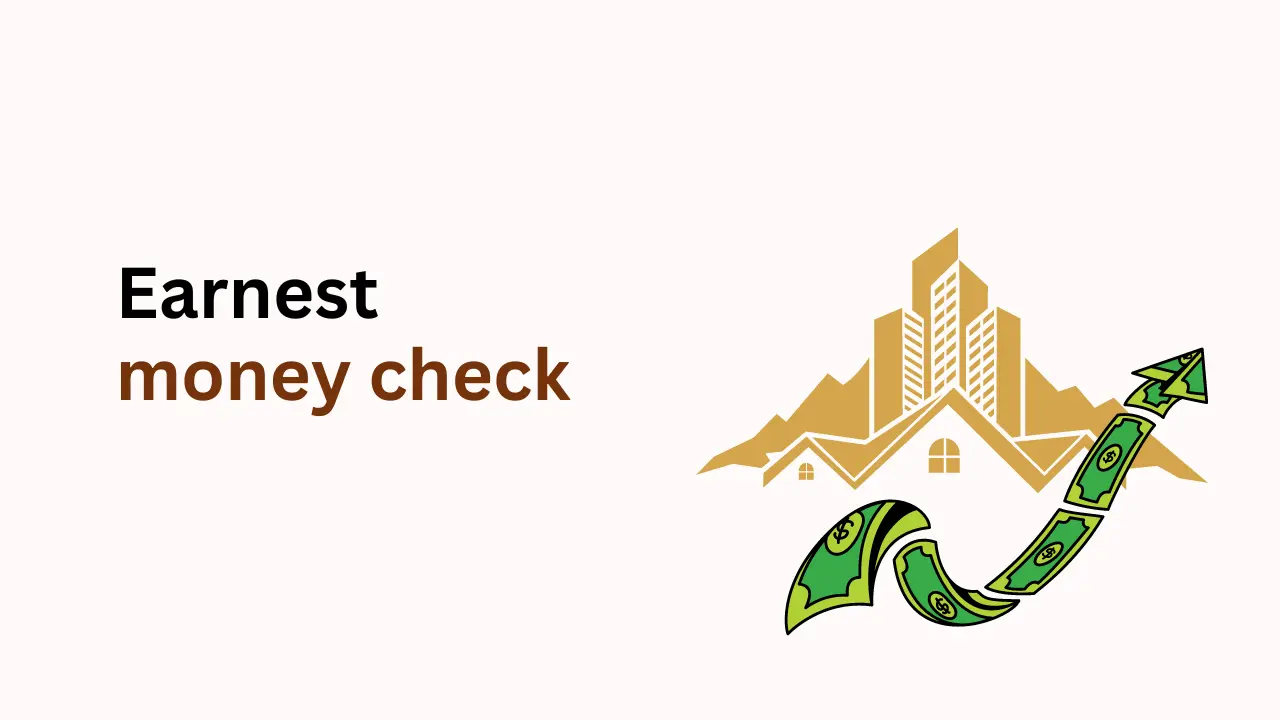When purchasing a home in your name you may have heard the word earnest money check but may not know about the meaning of this word which may leave some confused. While it could seem confusing initially but is really easy to understand. In this article I will tell you about earnest money checks while purchasing a property, your new home or any real estate asset.
We will get to know about its benefits, objective, process, contingencies, etc.
Table of Contents
What is Earnest Money?
Earnest money is a small deposit made by the purchaser or buyer when purchasing a real estate or a property as a sign of good faith or intent to buy the property which is usually a small portion of the whole price of the property. While it may sound like a down payment, there’s a finite difference, we’ll talk about it later. It tells the seller that the buyer is serious about p]making the purchase and wants to fulfil the contract when he arranges all the money in some time. It’s a commitment to the dela or the contract of purchase by the buyer.
Earnest money is usually heard in the real estate domain.
How Does Earnest Money Work?
When a buyer wants to purchase a property and he wants to secure that opportunity of purchasing the real estate acid or land then he pays a small portion of the total price of the land called earnest money.
It may be a sign of good faith or a contract to stop the other buyers from purchasing that property. However it is not the down payment of purchasing the property. The earnest money goes into a third party neutral account called the escrow account where this amount is held till the date the purchase or deal is confirmed or finalised.
If the purchase is finalised then the buyer makes his second step to acquire the asset under his ownership that is by converting the earnest money into the down payment.
However if the deal is not finalised then the money goes to the seller of the property to compensate for the time he had put in this contract and the opportunities that he had missed of the potential buyers who wanted to purchase that property.
The reason for not finalising the deal could be something that is out of contract. Usually the deal goes through and Earnest money gets converted to the down payment.
Is Earnest Money Refundable?
Earnest money can only be refunded if certain contingencies that are the conditions written in the contract are not met usually from the seller’s side. It totally depends upon the terms of the purchase agreement.
The clauses in the contract or not then the buyer can walk away from the deal without losing his earnest money which could have gone to the seller as down payment or opportunity cost otherwise.
Common contingencies include:
- Financing Contingency: if the purchaser of the property is unable to get a mortgage or the financing for the purchase then he can walk away from the daily without losing their earnest money deposit.
- Inspection Contingency: If in the property inspection either the buyer or the government inspector found some major issues, then the buyer can walk away from the contract by taking away their earnest money or can negotiate with the seller to work on the repairs.
- Appraisal Contingency: if the value of the property of the home appraises for less than the value of the sale price then the buyer can walk away from the contract with his earnest money or negotiate for a better price with the seller of the property.
These all conditions are able to give the earnest money back to the buyer of the property. However in case the buyer phase to meet the contract conditions or decides not to proceed with the deal for the reasons outside of the contingencies as return in the contract then there is a risk of losing the earnest money by the buyer.
Also Read: How Does Policygenius Make Money?
Earnest Money vs Down Payment: What’s the Difference?
People can often get confused between the down payment at the earnest money which is both used at the time of purchasing the real estate. However there are distinct points in this two financial contributions in the home buying process:
Earnest Money: This money is used to show the good faith or to secure the opportunity of buying the property and shows the buyer’s commitment to the deal which is usually 1-3% of the total price paid to the Purchase.
Down Payment: Down payment is the ocean of the properties price at which the buyer pays to secure the mortgage and is a much larger amount then the earnest money which could drink between 10-20% of the total price of the property. It is paid while closing the transaction and means that the Purchase has secured ownership in the property while the rest of the amount can be given later with the help of financing options.
Money is part of the upfront cost which is paid before the service is received while it’s usually applied toward the down payment at the time of closing.
When is Earnest Money Due?
Earnest money is due when the seller accepts the buyer’s offer and the duration of pain the amount could range between 1-3 days after accepting the offer. The amount could be paid by wire transfer, check or electronic transfer.
What Happens to Earnest Money at Closing?
At closing the sale of the property ghost through and the earnest money becomes a part of the down payment or the closing payment of the purchase of the property. It is considered a part of the purchase when the deal is closed.
But if the deal falls or the buyer backs out of the contract without giving a valid reason which is not covered by the contingency of the contract then the seller would keep the money.
Also Read: Understanding Thrivent Money Market and Money Canvas
Is Earnest Money Required?
Earnest money is required in most of the cases of real estate, especially when a huge amount of risk and money is on the line.
When there is high demand of the property and number of opportunities days knock the door to get the deal done in their favour then the earnest money is collected and is significant to show the buyers intent to purchase the property. It shows the seller the good faith of the buyer and gives them the confidence that the buyer won’t back down.
However it may not be considered significant in every situation like in cash transactions or highly competitive markets where some of the buyers would leave the earnest money to make their offers more attractive or want to sell the property for the amount that the highest bidder is ready to give.
Earnest Money in Tender Processes
In the case of tenders also earnest money is required as a way to secure the interest of the buyers in the project on the contract. It shows to the salad that the buyer will not back away from the bleeding process after he is selected.
Earnest Money Deposit (EMD) could be applied to the project cost or could be written to the buyer after he is awarded the contract and if he withdraws then the deposit is taken as a penalty for wasting the time of the seller.
Also Read: Discover money market account
Examples of Earnest Money
Real Estate Transaction: If a person is buying a home worth USD 1 million then he may give earnest money of $20,000 to show his seriousness and commitment in purchasing the property which will be held in escrow and would be a part of the down payment for closing cost once the deal is completed.
Tender Process: If a construction company bids on a project by the government, it may submit Earnest Money Deposit (EMD) to show its commitment and secure the contract. The deposit shows that the company is serious about completing the project if selected.
Is Earnest Money a Check or Cashier’s Check?
Most of the time earnest money is paid by a personal check or cashier check or a wire transfer or electronic transfer. Casual check is a more secure way of paying the nest money because it guarantees that the funds are available. Also it minimises the risk of insufficient funds.
Who Releases Earnest Money?
The escrow agent or title company responsible for holding the earnest money, releases the money to the buyer or the seller (depending upon the case). If the deal is complete, the money is transferred from the escrow account to cover the down payment or closing costs.
Earnest Money in Real Estate Contracts
In a real estate contract, the terms for earnest money are clearly given and defined. These terms include that amount of money, when the payment is due, the conditions aur clauses under which it can be refunded, etc.
To complete the deal or secure the contract, both parties, the buyer and the seller have to agree with the terms and conditions before moving forward.
Conclusion
Earnest money is an important part of the contract made between the seller and the purchase of the property before the down payment is made to secure the transaction and shows the commitment to the seller if the buyer is interested in purchasing the property.
It is a financial commitment that the bidder will honour to complete the deal. Understanding how earnest money works and it’s process can prevent costing mistakes by the purchases. It also gives the seller a piece of mind knowing that the buyer is serious about purchasing the real estate asset
Understanding the role and importance of earnest money will help navigate the process smoothly and should be known both by the buyer and the seller.






